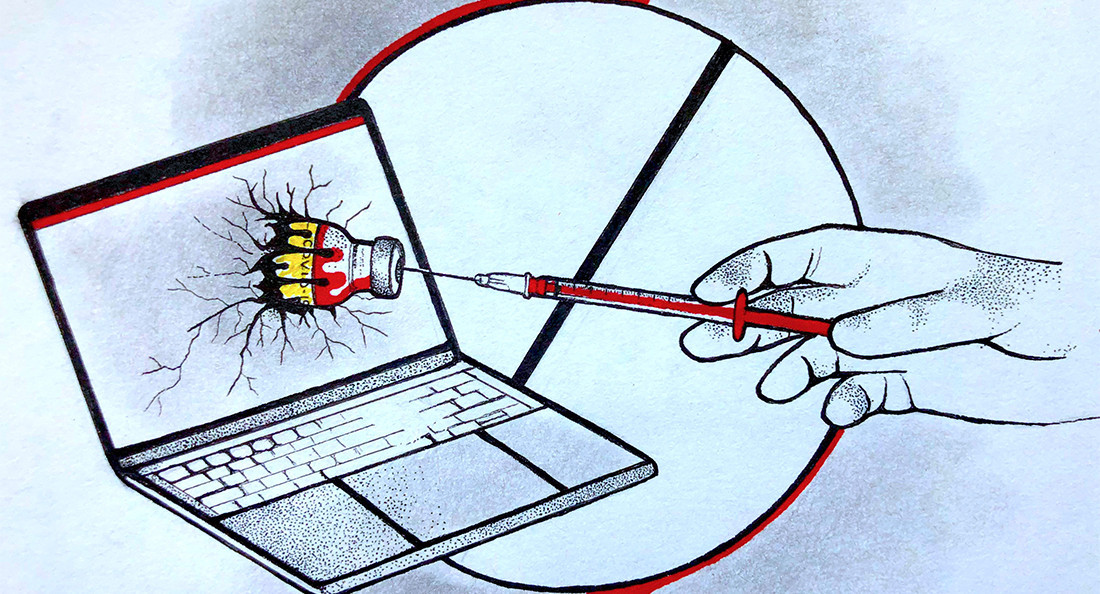Calling out COVID deniers won’t change their minds
But there are still benefits
About a month ago, while on an Instagram binge, I noticed an acquaintance of mine from high school had shared a story of a man in scrubs spewing COVID-19 conspiracy theories. In the video, the man made a number of claims, including that “the media” is exploiting pandemic content for views, the government is trying to control us, and the vaccine was created too quickly to be safe. None of it was highly original or believable.
I typed a knee-jerk “lmao are you stupid?” in the reply bar but froze over the send button.
I know most people don’t change their mind when you embarrass them online.
I recrafted the message and sent my high school acquaintance a link to statements from Manitoba’s doctors and nurses. We argued. Neither of us convinced the other of anything.
Fear of vaccines isn’t new. A now-debunked 1998 paper suggesting a link between vaccines and autism led to a measles outbreak in 2008 and 2009 after parents opted out of having their children vaccinated.
It’s easy to label anti-vaxxers as stupid, but the truth is a lot of people are just plain scared. Parents don’t put their kids at risk of catching a deadly disease unless they think they’re protecting them from something else.
A 2017 New Yorker article by Elizabeth Kolbert examined how, when presented with facts, more often than not, people will double down on misinformation that confirms their worldview.
Right now, COVID-19 is an extremely chaotic force in many people’s lives. Believing they are protecting themselves and their families by not getting the vaccine is one way individuals might feel like they are winning back control.
Since most people are not experts in epidemiology, it isn’t shocking that people are trying to understand this new virus in ways that fit within their perspectives.
But what can we do when a perceived threat of vaccines leads to real, dangerous consequences for people who are at higher risk for COVID-19?
Instagram has started to link to resources from the World Health Organization (WHO), as well as local health ministries, whenever someone searches for coronavirus-related material. When searching for vaccine info on Pinterest, users are only shown results from public health organizations like the WHO and Centers for Disease Control (CDC). Nonetheless, people who truly believe COVID-19 is a hoax will find voices to bolster that belief.
A popular way to combat COVID-19 deniers has been to call them out online, either by messaging them privately or quoting their tweets with disparaging comments.
In July, a Toronto woman filmed herself being denied service at a hospital after she refused to wear a mask. Twitter users tried pointing out that healthcare workers were simply trying to keep people safe, and some folks just made fun of her.
Despite the online teasing, the self-described “Freedom Lover” has continued to share information about upcoming anti-mask rallies on Twitter.
If someone believes from the bottom of their heart that Bill Gates has filled the COVID-19 vaccine with microchips, changing their mind seems unlikely.
But someone who is nervous about receiving the vaccine or who is wondering if all these precautions are really worth it might feel more assured when they see people they know and trust sharing accurate information.
Calling someone out for sharing vaccine misinformation might not lead to a moment of seeing eye to eye with them, but there is always still a chance that it will save someone from being persuaded to wade into the COVID-19 conspiracy swamp.
Allyn Lyons is a graduate of the University of Winnipeg and Red River College’s Creative Communications joint-degree program. Please don’t call her “Allen.”
Published in Volume 75, Number 15 of The Uniter (January 21, 2021)







